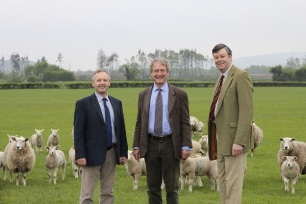
Moving CAP money up the hill was a major focus for the National Sheep Association (NSA) and Owen Paterson, Secretary of State for Environment, Food and Rural Affairs, when the Minister spent yesterday (Thursday 1st May) visiting NSA members and rural businesses near Kendal, Cumbria.
NSA facilitated an interesting and stimulating day for Mr Paterson at the gateway to the Lake District, one of the areas of England that will directly benefit from the recent Defra announcement that Pillar One payments on moorland will rise to £56 per hectare from next year, an increase of 90%.
Phil Stocker, NSA Chief Executive, says:“NSA is very pleased that Defra has decided to increase the payment to moorland areas and it was a great pleasure to host the Secretary of State in Cumbria so he could meet farmers who will directly benefit from this higher payment. It is all part of moving direct farm payments up the hill, which is something NSA has supported for a long time.
“The shift in this direction provides recognition that farms in less favoured areas provide a whole raft of public goods alongside the core activity of food production. We would have liked to see more progress in this area, with payments being targeted to land where active grazing and farming activity is being carried out, but it is definitely a step in the right direction.”
The lift in moorland payments cannot detract from the general downward pressure on direct payments (Pillar One) and so NSA also saw the day with Mr Paterson as opportunity to talk about Pillar Two and the Rural Development Progamme for England (RDPE). The emphasis was on ensuring this pot of money is targeted at farmers to increase productivity and competitiveness, while also improving resource efficiency and reducing greenhouse gas emissions. NSA has developed the concept of an animal health scheme under Pillar Two that does just that, by financially incentivising sheep farmers to tackle endemic disease relevant to their individual farming business, therefore reducing losses and producing more food with less inputs.
Mr Stocker explains: “We acknowledge the animal health budget within RDPE is insufficient to fund this scheme on a major scale, but we strongly believe it is justifiable to talk about reassessment of priorities within Pillar Two and a more equal balance between environmental projects and resource efficiency within food production systems. After all, it’s still a Common Agricultural Policy not a Common Environmental Policy.
“I think Mr Paterson appreciates NSA’s stance on this issue and the importance of not forgetting the vital role livestock farms play in economic activity and feeding the nation as well as further improving our iconic landscapes and environments. There is a lot of common ground between us when we talk about production, profitability and environmental enhancement running hand in hand.”
The Secretary of State spoke very passionately about the role of agriculture and rural businesses in strengthening the UK economy and, in order to reward good practice, he wanted the Government to be able to step away from bureaucracy and allow businesses to move forward. This view dovetails perfectly with two issues that are very important to NSA – driving supply chain efficiencies and ensuring burdensome regulation does not force farmers out of sheep production – two issues that Mr Paterson picked up strongly during his visit.
John Geldard, NSA Chairman and host farmer for Mr Paterson’s trip, says: “The Secretary of State must be congratulated for his strong convictions and clear vision that agriculture is a vital part of our country’s economy. But for us to continue to grow our export market we must see a relaxation of the TSEs rules that devalue British lamb by giving the impression that we split carcases in the UK because of disease presence. There is no evidence of risk and the continuing need to split carcases of old season lambs adds unnecessary cost and reduces export potential.
“With the world population growing we also need to increase output. We have seen some recovery of the UK breeding flock but long-term sustainability or growth will only be possible if common sense is introduced into our burdensome sheep identification rules. Mr Paterson picked this up very strongly and even asked us what tolerance we would like introduced. We think 5% tolerance is entirely appropriate when you look at the level of risk and the capability of the equipment and systems we have.
“Now is a time of opportunity and it was very heartening to meet with the Secretary of State and find common ground when discussing the huge potential within the sheep sector.”
